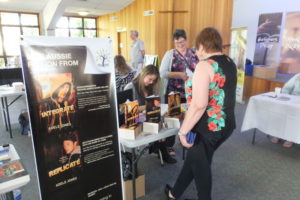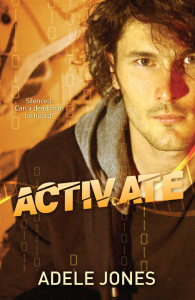 Saturday I received copies of my new novel Activate hot off the press and had the pleasure of sharing it with attendees at the Omega Writers Book Fair 2016. Technically its release date is Nov 1, 2016, but with next week (Sept 11-17) being Disability Action Week 2016 in Queensland, I can’t think of more perfect timing.
Saturday I received copies of my new novel Activate hot off the press and had the pleasure of sharing it with attendees at the Omega Writers Book Fair 2016. Technically its release date is Nov 1, 2016, but with next week (Sept 11-17) being Disability Action Week 2016 in Queensland, I can’t think of more perfect timing.
You see, Blaine Colton, the hero of the Integrate trilogy, is a young man acutely aware of the stigma and challenges disability can represent. Having survived mitochondrial disease and received a gene-modifying cure, he has been given a second chance. But things aren’t perfect for the teenager, and he’s never forgotten where he’s come from – nor where he could very well end up. (But you’ll have to read the books to find out more … 😉 )
The motto of Disability Action Week celebrations is: ‘Inclusion: It’s a game changer’. And I love it. In fact, I’d love to apply it in every circumstance. I’ve seen how easily we (and I include myself in this) can disregard others because they don’t fit. Whether this be determined by a ‘click’ group, trends, or someone who simply doesn’t meet some predetermined criteria for abilities on the sports field or whatever activity is on the table, people get left out. Add what can be perceived as limitations, and it can be all too easy to discard people from our plans.
No one likes being excluded.
 As a parent I often find myself saying, ‘Ensure you’re being inclusive.’ In reality this has to be a purposeful decision and is largely influenced by the type of disability present. For example, if someone is mobility impaired, accessibility to venues, terrain and physical requirements of an event or activity need to be well considered. Some disabilities are not obvious, and might involve environmental or emotional triggers. Often a lot of little things are overlooked by well meaning people for sheer lack of awareness. (As I have done myself, at times.)
As a parent I often find myself saying, ‘Ensure you’re being inclusive.’ In reality this has to be a purposeful decision and is largely influenced by the type of disability present. For example, if someone is mobility impaired, accessibility to venues, terrain and physical requirements of an event or activity need to be well considered. Some disabilities are not obvious, and might involve environmental or emotional triggers. Often a lot of little things are overlooked by well meaning people for sheer lack of awareness. (As I have done myself, at times.)
Many people I know living with a disability are fiercely independent and very capable. When it comes to solutions, they are brilliant for nutting things out. By communicating and working with people, instead of assuming the limitations of their capacity, inclusion becomes a way of thinking and truly can ‘change the game’.
Good on you for addressing disability issues in your books, Adele. Having read the first two (and a sneak peak at the third), I’ve really loved the way you’ve given an insight into disability from the protagonist’s POV and the myriad of ethical issues in treatment (e.g. gene therapy). It’s great to see YA books that deal with these issues in a sensitive way and have a hopeful theme. I hope the new book does really well.
Thanks, Nola. It’s certainly a big issue and something everyone encounters in life, either directly, or through those they connect with. I hope my writing in some way reminds readers of the humanity of each individual living with disability, and challenges the means by which we as a society measure a person’s worth.
Thank you, Nola. I do hope the fictional representation of Blaine’s experiences, even though employing much creative license, sparks interest for readers and brings greater appreciation for the challenges faced by people with a disability. I agree it is important to have a hopeful theme, even when facing such serious issues.